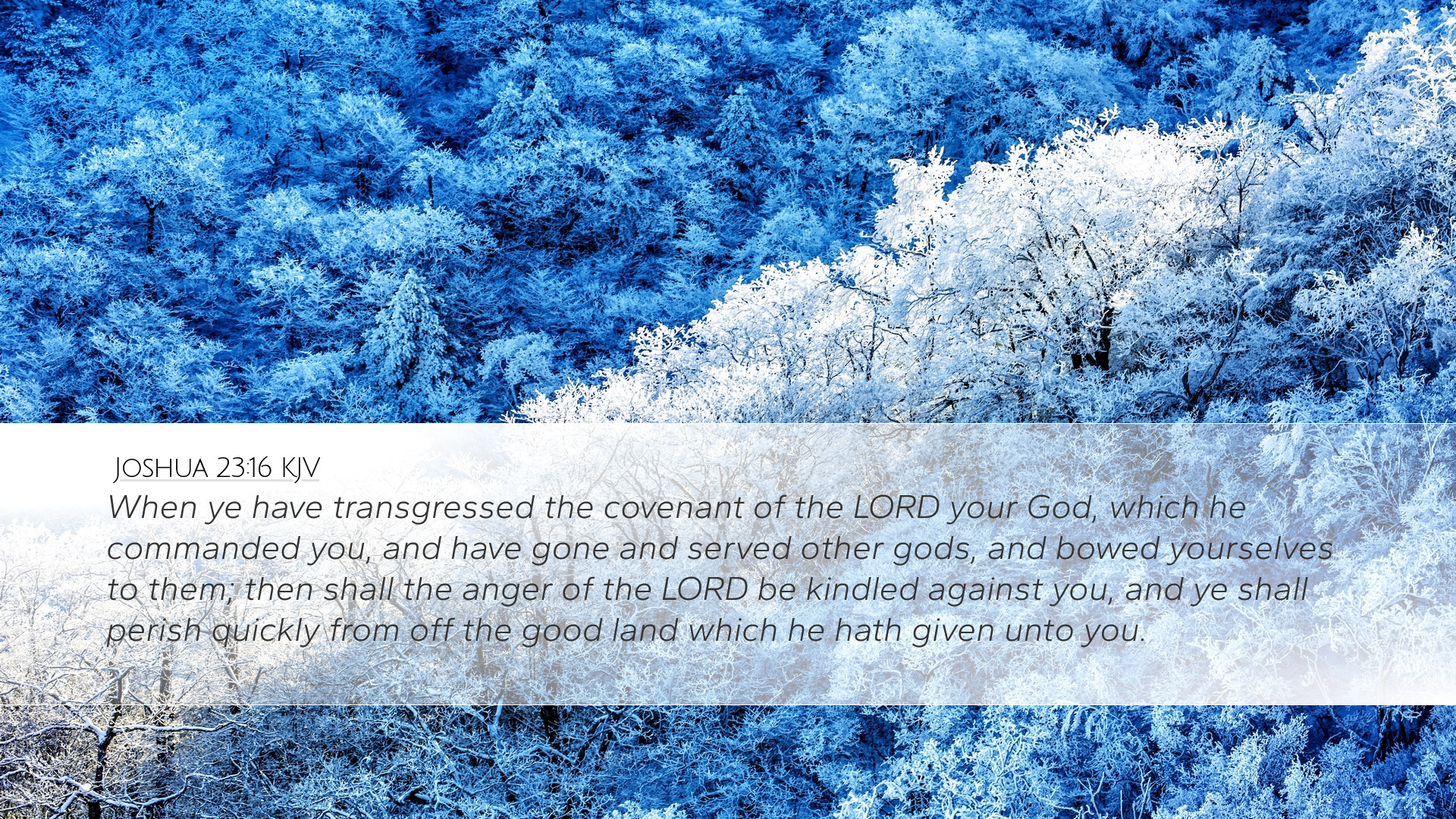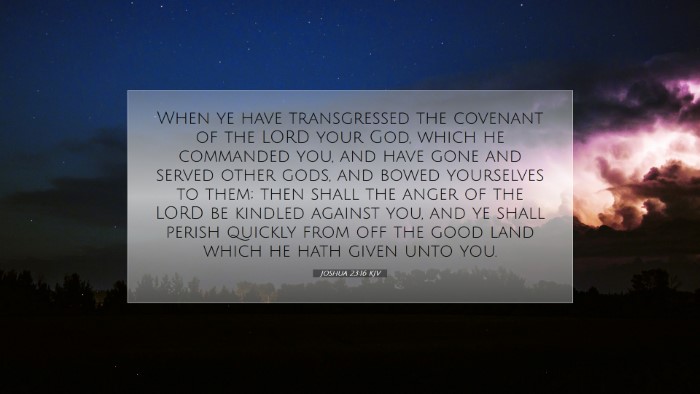Old Testament
Genesis Exodus Leviticus Numbers Deuteronomy Joshua Judges Ruth 1 Samuel 2 Samuel 1 Kings 2 Kings 1 Chronicles 2 Chronicles Ezra Nehemiah Esther Job Psalms Proverbs Ecclesiastes Song of Solomon Isaiah Jeremiah Lamentations Ezekiel Daniel Hosea Joel Amos Obadiah Jonah Micah Nahum Habakkuk Zephaniah Haggai Zechariah MalachiJoshua 23:16
Joshua 23:16 KJV
When ye have transgressed the covenant of the LORD your God, which he commanded you, and have gone and served other gods, and bowed yourselves to them; then shall the anger of the LORD be kindled against you, and ye shall perish quickly from off the good land which he hath given unto you.
Joshua 23:16 Bible Commentary
Bible Commentary on Joshua 23:16
Verse Overview: Joshua 23:16 states, "When you transgress the covenant of the LORD your God, which He commanded you, and go and serve other gods, and bow down to them, then the anger of the LORD will be kindled against you, and you shall perish quickly from the good land that He has given you."
Context of the Passage
This verse constitutes part of Joshua's farewell address to Israel. He gathers the leaders and the people to exhort them to remain faithful to God's covenant. This moment builds upon God’s promises and the warnings regarding the consequences of disobedience.
Thematic Insights
- The Conditional Nature of God's Covenant: The covenant with God is not unconditional. It requires faithfulness and obedience. As Matthew Henry points out, transgression disrupts the relationship between God and His people.
- The Severity of Idolatry: Engaging with other gods is seen as a grave offense. Adam Clarke notes that the Israelites were repeatedly warned against the temptations of idolatry, which leads to severe consequences.
- The Consequences of Disobedience: The notion of God's anger highlights His holiness and justice. Albert Barnes emphasizes that ignoring the covenant results in loss—not just of land, but of the divine presence and blessing.
Exegesis of Key Components
-
Transgression and Covenant:
Transgression refers to any breach of the established covenant with Yahweh. It is indicative of a fundamental choice between faithfulness and rebellion, as indicated in various passages by Matthew Henry.
-
Serving Other Gods:
This serves as a reminder of the pervasive temptation that was always present in the surrounding cultures. Adam Clarke emphasizes the necessity of vigilance against external influences that could sway them from devotion to Yahweh.
-
God's Anger and Judgment:
The expression of God’s anger represents His righteous indignation towards sin. This is echoed in biblical literature, and Albert Barnes highlights that such anger is not arbitrary but rooted in God’s character as a faithful covenant keeper.
-
Perishing from the Good Land:
The eventuality of losing the good land symbolizes the loss of opportunity, blessing, and communion with God. The land is described as a gift from God, thus the implications of such loss are profound, affecting both the individual and the nation.
Practical Applications
From Joshua 23:16, several key takeaways emerge for pastors, theologians, and students:
- Faithfulness to God: The necessity for a continual commitment to God and His commandments as central to the believer's life.
- Awareness of Idolatry: Recognizing modern forms of idolatry—whether cultural, material, or spiritual—that can lead one away from true worship.
- The Importance of Remembrance: The role of memory in spiritual life; recalling God’s past faithfulness can strengthen obedience and prevent future transgression.
- Community Responsibility: Emphasizing the corporate nature of faith; encouraging mutual accountability within the community of believers.
Theological Reflections
This verse opens up deeper theological reflections on the nature of divine-human relationships:
- Sovereignty and Free Will: The dynamic interplay between God's sovereign choices and human agency is illustrated as believers are encouraged to choose faithfulness.
- Covenantal Theology: Reflecting on the significance of covenants throughout Scripture—how they establish the framework for understanding God’s promises and expectations.
- Judgment and Grace: The tension between God’s judgment for transgression and His grace offered for repentance. This duality is critical to understanding biblical theology.
Conclusion
The admonition in Joshua 23:16 acts both as a historical reminder and a contemporary challenge, urging adherence to God’s covenant in an age where competing allegiances abound. The insights drawn from public domain commentaries underscore the lasting relevance of this exhortation, framing it within a liturgical, pastoral, and academic discourse that calls for engaged and faithful living in response to God’s love and commands.


